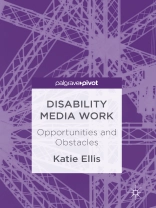This book interrogates trends in training and employment of people with disabilities in the media through an analysis of people with disabilities’ self-representation in media employment. Improving disability representations in the media is vital to improving the social position of people with disability, and including people with lived experience of disability is integral to this process. While the media industry has changed significantly as a result of digital and participatory media, discriminatory attitudes around fear and pity continue to impact whether people with disability find work in the media. The book demonstrates no significant changes in attitudes towards employing disabled media workers since the 1990s when the last major research into this topic took place. By focusing on the employment of people with disability in media industries, Katie Ellis addresses a neglected area of media diversity, appealing to researchers in media and cultural studies as well as critical disability studies.
Mục lục
Chapter 1: ‘It’s hugely important’: The un/employment of people with disability in the media.- Chapter 2: The media industry is competitive and cut-throat: Taking a subject-centred approach to media education.- Chapter 3: Newsrooms to now media: Disabled journalists.- Chapter 4: The industry’s response: From broadcast to alternative and community media.- Chapter 5: A collective phew: Disability acting.- Chapter 6: Digital disability media disclosure: The business of blogging and web series diversity.- Chapter 7: Disability participation in the media: New directions for research.
Giới thiệu về tác giả
Katie Ellis is Senior Research Fellow and Convenor of the Critical Disability Studies Research Network in the Internet Studies Department at Curtin University, Australia. She has published widely in the area of disability, and digital and networked media, extending across both issues of representation and active possibilities for social inclusion.












